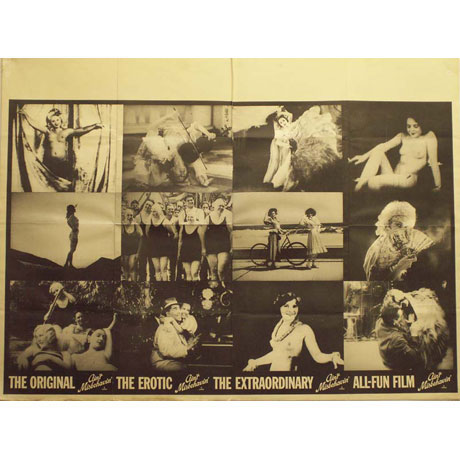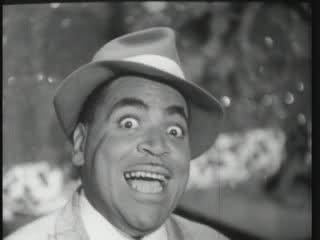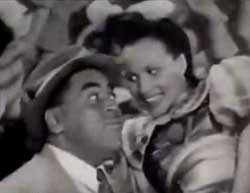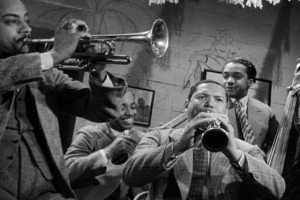Ain’t Misbehavin’
Great Britain, 1974 Directors: Peter Neal, Anthony Stern
Cert–X (London). dist–Focus. p.c–Al0K Pictures Ltd. p–David
Speechley. ed–Peter Neal, Misha Norland. m/songs–“Please Be Kind”
performed by Django Reinhardt; “The Man I Love” by George Gershwin,
Ira Gershwin, performed by Django Reinhardt; “Honeysuckle Rose”,
“Ain’t Misbehavin'” by and performed by Fats Waller; “Adagio in G
Minor” by Albinoni; “Don’t Be a Baby” performed by Ahmed Rai,
Betty Underwood; “Ain’t Gonna Be Your Dog” by and performed by
Meade Lux Lewis; “Cabaret Echoes” performed by Anthony Parenti’s
Famous Melody Boys; “Charlie Is My Darling” performed by Black
Dyke Mills Band; “No One But the Right Man Can Do Me Wrong”
performed by Sophie Tucker; “Animals’ Ball” performed by Lizzie
Miles; “My Canary’s Got Circles Under His Eyes” performed by Elsie
Carlisle; “Shy Guy” performed by Nat Cole Trio; “Londonola”
performed by Roy Fox; “Boogie Woogie at the Civic Opera” by and
performed by Albert Ammons; “My Old Man” performed by Lilly
Morris; “With My Little Ukelele in My Hand” performed by George
Formby; piece by Ivy Benson Orchestra. titles–Ray Cowell, Freeman
May Studio Ltd. sd. ed–Trevor Williamson. sd. re-rec–Malcolm
Bristow. 7,650 ft. 85 mins.
There is so much interest and fascination in the bulk of the
extremely varied material included in this compilation film that it
may seem churlish to object to some of the ways that it is used. The
makers’ apparent ambitions, after all, are exploitative only in a
modest way, and considering the mainly gentle ambience of nostalgia
and camp that pervades their assembly, Peter Neal and Anthony
Stern clearly cannot be charged with launching a candidate in the
Mondo Cane sweepstakes. The basic formula is simple enough:
intercutting ‘blue’ movies from the first four decades of the century
with clips of popular music and dancing and excerpts from newsreels
and other shorts — most of the latter restricted to ‘topical’ features
involving women — drawn from roughly the same period. Beginning
with an undated early clip of nude girls cavorting on a rocky hill and
beach, the film passes directly to footage of women in fancy clothes.
Next comes Famille ldéale, a 1907 stage film set in a classic bourgeois
household (husband, wife, butler, maid, military man) executed
with an antic liveliness that is dampened only by the obtrusive
addition of sound effects (including laughter and applause) which
imply something of an insult to the capacities of both the audience
and the material. This is followed by a wonderful Thirties
performance by Fats Waller of his “Honeysuckle Rose”, delivered in the
characteristic style of his jukebox shorts — with at least seven women
perched on or around his piano and a general impression that,
simultaneously, he is wooing each of them with lewd winks and
bulging eyes, carrying on a running commentary about all of them
with the audience, teasing everyone with his lyrics, and playing the
most spirited piano of the decade. (His performance of the title tune
at the end of the film is no less magnificent.) The title “Meanwhile . . .”
introduces us to silent shots of women vacationing, with the use of
Albinoni conveying a sense of historical pathos that is abruptly
broken by a comic glimpse of a woman sliding across an ice-skating
rink. A female wrestling match, Hollywood starlets modeling
bathing suits, a stag film from the Thirties involving Santa Claus
and a dildo, another from 1907 featuring a masturbating nun
and Danish titles, elaborate dancing exercises and all-women
orchestras are among the subsequent esoterica offered, as well as
performances by a poker-faced and portly Meade Lux Lewis (in a
wonderfully jivey number, complete with cast and mini-plot),
Sophie Tucker, Nat “King” Cole in his piano trio days, Lou
Abelardo, George Formby and others, which are occasionally
fragmented. and intercut with other footage. There’s also an
exceptionally cruel demonstration of how to turn an ugly girl
into a salon beauty, grotesque physical contortions by a female
performer while playing a violin out of tune, and a badly shot
French stag film from the Forties about bondage. The problem
with Ain’t Misbehavin’ is that its very uneven and unequal
collection of material is mixed and juxtaposed in a way that
often undermines the singularity of the individual pieces,
casting them into an essentially ahistorical context inviting
complaisant comparisons and easy platitudes which a more
consistent identification and dating of clips might have partially
avoided. But apart from its undebatable musical pleasures, the film
can at least be credited for eliciting that same historical curiosity
that it frequently frustrates.
JONATHAN ROSENBAUM








